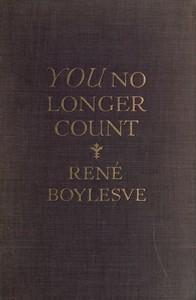|
|
Read this ebook for free! No credit card needed, absolutely nothing to pay.Words: 49376 in 17 pages
This is an ebook sharing website. You can read the uploaded ebooks for free here. No credit cards needed, nothing to pay. If you want to own a digital copy of the ebook, or want to read offline with your favorite ebook-reader, then you can choose to buy and download the ebook.

: You no longer count (Tu n'es plus rien!) by Boylesve Ren Houghton Louise Seymour Translator - World War 1914-1918 Fiction@FreeBooksThu 08 Jun, 2023 From the swoon into which the sudden, agonizing shock had thrown her, her soul escaped, shook itself free, as the mind shakes off a nightmare. There is first a sensation of relief from discomfort, then a cheering sense of safety, and one slips contentedly into a half-slumber. Then it all begins again, for one no longer believes that it answers to any reality. Was she still asleep? Was it memory, was it imagination that unrolled before her vision pictures of the past which yet her musings had never till then evoked, and which suddenly presented themselves with annoying vividness? There were whisperings, murmuring voices in the next room. She was aware of them, yet to the unwonted sounds she paid no attention; the gentle, persistent pressure of an invisible hand turned back her thoughts to days gone by. A hushed step upon the carpet, a finger questioning her pulse, no more disturbed her than the familiar cry of the huckster in the street. She did not wonder: "What, am I ill? Are they anxious about me? Why am I in bed, in broad daylight, I so young, so unused to illness of any kind?" She was recalling a certain time, days that seemed far remote, a period of her life that seemed to have been acted before her eyes, like a play in the theatre. A summer month of one of the previous years. She saw again the last days in her suburban home, just outside of Paris, the sloping garden and the vista through the leafage over far-distant hills, splendid and ethereal. Every one was getting ready for the summer holiday; some of the men were going to the training-camps. What a world of talk! What discussions with friends who had been invited to the country for an afternoon of farewells! They were a world by themselves--young, alert, fond of pleasure, and of all things beautiful and adventurous, care-free, and charming. The oldest of the men was M. de la Villaumer, whose hair was beginning to turn gray, but who enjoyed himself only among kindly faces. Several were artists--musicians or painters. They loved the beautiful things of life and that life of the intellect which easily adapts itself to the beautiful. Love was king in their circle, a love rather kindly than passionate, whose ravages they had learned how to conceal. Yet many admirable couples were found among them. Odette Jacquelin and her husband were always cited as the most enamoured pair of the group. After them came Clotilde and George Avvogade, who cooed like turtle-doves, but were lovers only "for a curtain-raiser," it used to be said. Rose Misson, whom they called "good Rose," Simone de Prans, Germaine Le Gault, were all women who adored their husbands and asked for no other happiness, having no idea of anything else than happiness. Why, they used to ask, was Jean Jacquelin an officer of reserves? What was the sense of that biennial war-game for a chap who had nothing military in him, whether by tradition, education, or belief? The old father had made a point of it, because he held to the ineradicable prejudices of his time. As for Jean himself, he made light of it; he was a young fellow well on the way to make a fortune and give Odette all the luxuries that in their circle were considered not superfluities, but things indispensable. It never occurred to him that any other purpose could seriously occupy a man's mind. Without entering into the thousand and one interests of certain of his more cultivated friends who were given to reasoning and theorizing, he simply found that the uniform of a sublieutenant was becoming, and that, when he was obliged to wear it, it was simply an opportunity to make himself fit; physical fatigue was nothing to him; he might be inclined to think the Grand Manoeuvres a superannuated exercise; he might even smile at them and amuse himself by enumerating the blunders of such and such a commander; but something always kept him from ever making light of the thing itself. For that matter, being a reserve officer was perhaps one of the many whims of society, but it was what is called decent; in certain circles it was done. So he let them talk and harangue, opposing no arguments but continuing to be a reserve officer, carrying through his period of instruction when he was called. Telegrams had come from the sublieutenant. "Be at Pont-de-Piles to-morrow, darling," or "Ligueil, such a day for lunch," or "Loches, H?tel de France, after breaking up." And she had sometimes waited a long while in wayside inns or beside dusty highways. Conversations at table began to come back to her. Every one had been talking of the manoeuvres, discussing the names of generals, the communes that were being occupied. The presence of the President of the Republic was an event in the countryside. There had been old men who would consent to speak of nothing nearer than 1870; others, of fewer years, would recall the magnificent condition of the reconstituted army at the time of Gambetta's death, or at the period of the Schnaebele affair, when the country was so near to seeing it in action. A politician of the neighborhood--not more stupid, after all, than most of his contemporaries--rubicund, his eyes bloodshot at the end of dinner, had fallen foul of all these memories, regrets, would-be warlike emotions, and turned them upside down like eggs in a frying-pan. According to him, war was the scourge of bygone ages. France, the nation of progress, still consented to carry on a semblance of it, by way of facilitating necessary transitions, but it was a mere play of protocols, a final concession to the past. War was destructive; modern society was interested wholly in production; to believe in war was to turn back the clock of history. For that matter, every well-informed person was aware that scientific means of destruction had become such that a fratricidal conflict had been rendered impossible, im-pos-si-ble! One must be an idiot not to perceive that everything would be reduced to fragments in the twinkling of an eye. The manoeuvres! ah, you made him laugh with your manoeuvres! The manoeuvres were no more like war than a toy pistol was like a German mortar. War, should it ever break out, would not last the time it would take to concentrate your army corps; the first of two adversaries who should be half a day ahead would bring the other to cry mercy. "Well, say," some one had interrupted, "it wouldn't be a bad plan, then, to do one's best to get that half-day's advance?" "Useless! Count your population, consider your aspirations. Think of the finances. Finances! There is not a country of great armaments that could maintain war for six weeks, nor one that could even endure three years' preparation for war.... Ask the great banks, which have the world in leading-strings, emperors and kings as well as peoples; don't deceive yourselves; war is impossible, im-pos-si-ble! We are witnessing, with your manoeuvres, the final deeds of a prehistoric age.... Turn your eyes to the future, gentlemen, and all this bedizened and vociferous gang will seem to you like children's toys!" "But Germany--the militant party--the Pangermanists?" "Germany is a pacific nation, industrial and commercial, which uses its cannon as an advertising dodge. What we lack--don't you know?--is precisely business sense. And Germany has business sense. The military party? A drop of water in a lake. The Pangermanists? Advertising men in the pay of the national industry. In the first place, the Emperor, as every one says who has seen him near at hand, is a secret friend of France ... and I will add, the most republican of us all. Socialism, that's his enemy! ... The army that we need is not a rabble of soldiers, but a group of men bent upon keeping the peace. Humanity is on the march--it can never be repeated too often--toward a future of liberty, equality, fraternity. Ah, you must reckon with economic rivalry; that is the law of life." "Precisely so." Free books android app tbrJar TBR JAR Read Free books online gutenberg More posts by @FreeBooks
: Land without chimneys; or the byways of Mexico by Coffin Alfred Oscar - Mexico Description and travel@FreeBooksThu 08 Jun, 2023

: The night wire by Arnold H F Henry Ferris - Short stories; Horror tales; News agencies Fiction@FreeBooksThu 08 Jun, 2023
|
Terms of Use Stock Market News! © gutenberg.org.in2025 All Rights reserved.






